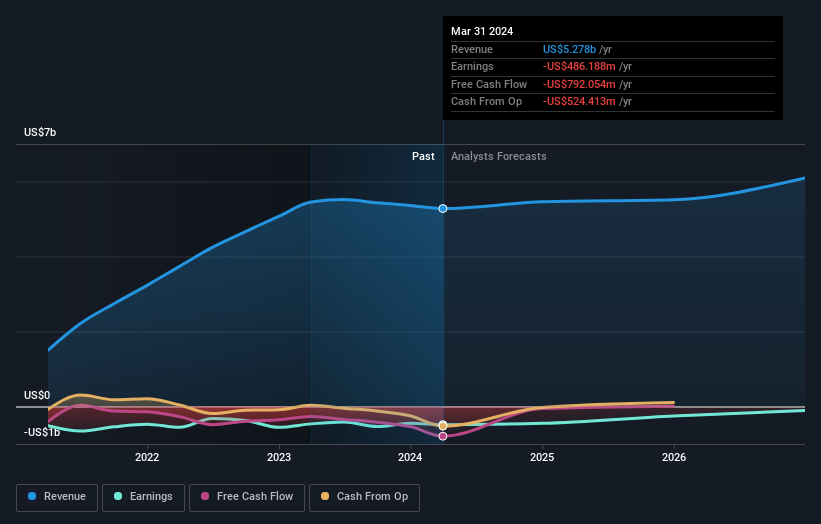Both individual investors who control a good portion of Spirit Airlines, Inc. (NYSE:SAVE) along with institutions must be dismayed after last week's 16% decrease
Key Insights
The considerable ownership by individual investors in Spirit Airlines indicates that they collectively have a greater say in management and business strategy
The top 25 shareholders own 36% of the company
If you want to know who really controls Spirit Airlines, Inc. (NYSE:SAVE), then you'll have to look at the makeup of its share registry. And the group that holds the biggest piece of the pie are individual investors with 57% ownership. That is, the group stands to benefit the most if the stock rises (or lose the most if there is a downturn).
While institutions, who own 42% shares weren’t spared from last week’s US$78m market cap drop, individual investors as a group suffered the maximum losses
Let's delve deeper into each type of owner of Spirit Airlines, beginning with the chart below.
See our latest analysis for Spirit Airlines
What Does The Institutional Ownership Tell Us About Spirit Airlines?
Many institutions measure their performance against an index that approximates the local market. So they usually pay more attention to companies that are included in major indices.
Spirit Airlines already has institutions on the share registry. Indeed, they own a respectable stake in the company. This can indicate that the company has a certain degree of credibility in the investment community. However, it is best to be wary of relying on the supposed validation that comes with institutional investors. They too, get it wrong sometimes. If multiple institutions change their view on a stock at the same time, you could see the share price drop fast. It's therefore worth looking at Spirit Airlines' earnings history below. Of course, the future is what really matters.
Spirit Airlines is not owned by hedge funds. The Vanguard Group, Inc. is currently the company's largest shareholder with 9.6% of shares outstanding. BlackRock, Inc. is the second largest shareholder owning 7.2% of common stock, and State Street Global Advisors, Inc. holds about 3.0% of the company stock.
A deeper look at our ownership data shows that the top 25 shareholders collectively hold less than half of the register, suggesting a large group of small holders where no single shareholder has a majority.
While studying institutional ownership for a company can add value to your research, it is also a good practice to research analyst recommendations to get a deeper understand of a stock's expected performance. There are a reasonable number of analysts covering the stock, so it might be useful to find out their aggregate view on the future.
Insider Ownership Of Spirit Airlines
The definition of an insider can differ slightly between different countries, but members of the board of directors always count. The company management answer to the board and the latter should represent the interests of shareholders. Notably, sometimes top-level managers are on the board themselves.
I generally consider insider ownership to be a good thing. However, on some occasions it makes it more difficult for other shareholders to hold the board accountable for decisions.
Our data suggests that insiders own under 1% of Spirit Airlines, Inc. in their own names. It appears that the board holds about US$3.0m worth of stock. This compares to a market capitalization of US$422m. Many investors in smaller companies prefer to see the board more heavily invested. You can click here to see if those insiders have been buying or selling.
General Public Ownership
The general public, mostly comprising of individual investors, collectively holds 57% of Spirit Airlines shares. This level of ownership gives investors from the wider public some power to sway key policy decisions such as board composition, executive compensation, and the dividend payout ratio.
Next Steps:
While it is well worth considering the different groups that own a company, there are other factors that are even more important. For instance, we've identified 2 warning signs for Spirit Airlines (1 doesn't sit too well with us) that you should be aware of.
Ultimately the future is most important. You can access this free report on analyst forecasts for the company.
NB: Figures in this article are calculated using data from the last twelve months, which refer to the 12-month period ending on the last date of the month the financial statement is dated. This may not be consistent with full year annual report figures.
Have feedback on this article? Concerned about the content? Get in touch with us directly. Alternatively, email editorial-team (at) simplywallst.com.
This article by Simply Wall St is general in nature. We provide commentary based on historical data and analyst forecasts only using an unbiased methodology and our articles are not intended to be financial advice. It does not constitute a recommendation to buy or sell any stock, and does not take account of your objectives, or your financial situation. We aim to bring you long-term focused analysis driven by fundamental data. Note that our analysis may not factor in the latest price-sensitive company announcements or qualitative material. Simply Wall St has no position in any stocks mentioned.

 Yahoo Finance
Yahoo Finance 

